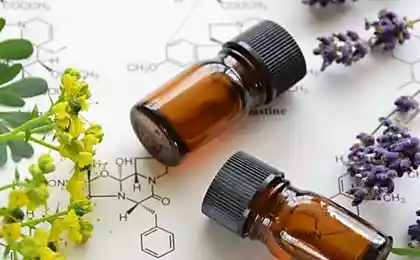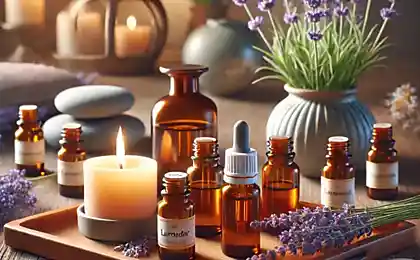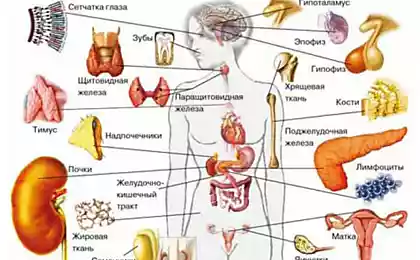515
How essential oils act on the endocrine system
Hormones are chemical substances that have extremely high physiological activity and are produced by glands of internal secretion (endocrine glands), or individual cells. The word "hormone" comes from the Greek "hormnein" — "to excite or set in motion".
Hormones stimulate the activity of an organ, control metabolism, regulate cell activity and permeability of cell membranes, as well as the specific functions of the body. Their feature — serve the ability to act at a distance: getting with the flow of blood in various organs and systems of the organism, they regulate the activity of the body, located far from the gland, and their synthesis.
The endocrine glands controlled by the pituitary gland and the hypothalamus, which is responsible for the coordination between the brain, nervous and endocrine systems.
The pituitary, along with the regulation of other glands, is driving growth. The thyroid participates in growth processes and metabolism. The parathyroid glands regulate the calcium level in the blood. The adrenal glands are involved in various body functions, including metabolism of starches, the body's response to stress and functioning of testes in men and the ovaries in women. The pancreas produces insulin that controls the sugar level in the blood. Testes and ovaries produce male and female hormones, estrogen, progesterone, testosterone and others, regulate reproductive cycle, lactation and the development of secondary sexual characteristics.

Essential oils can affect the endocrine system in two ways:
some oils contain plant hormones (phytohormones) that influence the human body like hormones and stimulate their action. Plant hormones can be used in the same way as in traditional medicine used synthetic or animal hormones, with the only difference that they do not cause side effects.
Other oils harmonize the production of hormones by various glands. For example, garlic and onions stimulate the activity of the thyroid gland. Basil, geranium and rosemary stimulate the adrenal cortex, although the geranium also harmonizes the production of hormones in General. Eucalyptus and juniper reduced the level of sugar in the blood, and here again the geranium acts as a balancing factor.
Many oils (mostly Umbelliferae) contain anethole that has properties similar to estrogen. These oils are very useful in disorders of the menstrual cycle and problems associated with menopause. These include oils of sweet fennel and tarragon. Another substances that have estrogen-like effect, is sclareol found in Clary sage. Similar action is and the cypress: the active substance is not yet identified, but assumed it diterpene molecules.
Estrogen should always be balanced by progesterone, but none of the essential oils does not contain molecules, such as progesterone, so we have to turn to medicinal herbs such as chasteberry (Vitex agnus castus) or cuff soft (Alchemilla mollis), which can be used in the form of tinctures or tablets.
The most powerful effect essential oils have on the endocrine system and all of the plant hormones we know very little. It is possible that many oils affect the body on a subtle hormonal level, and the mechanisms of this effect are still not entirely clear. published
Author: Patricia Davis
P. S. And remember, only by changing their consumption — together we change the world! ©
Join us in Facebook , Vkontakte, Odnoklassniki
Source: vk.com/health_natural?w=wall-69565480_76508
Hormones stimulate the activity of an organ, control metabolism, regulate cell activity and permeability of cell membranes, as well as the specific functions of the body. Their feature — serve the ability to act at a distance: getting with the flow of blood in various organs and systems of the organism, they regulate the activity of the body, located far from the gland, and their synthesis.
The endocrine glands controlled by the pituitary gland and the hypothalamus, which is responsible for the coordination between the brain, nervous and endocrine systems.
The pituitary, along with the regulation of other glands, is driving growth. The thyroid participates in growth processes and metabolism. The parathyroid glands regulate the calcium level in the blood. The adrenal glands are involved in various body functions, including metabolism of starches, the body's response to stress and functioning of testes in men and the ovaries in women. The pancreas produces insulin that controls the sugar level in the blood. Testes and ovaries produce male and female hormones, estrogen, progesterone, testosterone and others, regulate reproductive cycle, lactation and the development of secondary sexual characteristics.

Essential oils can affect the endocrine system in two ways:
some oils contain plant hormones (phytohormones) that influence the human body like hormones and stimulate their action. Plant hormones can be used in the same way as in traditional medicine used synthetic or animal hormones, with the only difference that they do not cause side effects.
Other oils harmonize the production of hormones by various glands. For example, garlic and onions stimulate the activity of the thyroid gland. Basil, geranium and rosemary stimulate the adrenal cortex, although the geranium also harmonizes the production of hormones in General. Eucalyptus and juniper reduced the level of sugar in the blood, and here again the geranium acts as a balancing factor.
Many oils (mostly Umbelliferae) contain anethole that has properties similar to estrogen. These oils are very useful in disorders of the menstrual cycle and problems associated with menopause. These include oils of sweet fennel and tarragon. Another substances that have estrogen-like effect, is sclareol found in Clary sage. Similar action is and the cypress: the active substance is not yet identified, but assumed it diterpene molecules.
Estrogen should always be balanced by progesterone, but none of the essential oils does not contain molecules, such as progesterone, so we have to turn to medicinal herbs such as chasteberry (Vitex agnus castus) or cuff soft (Alchemilla mollis), which can be used in the form of tinctures or tablets.
The most powerful effect essential oils have on the endocrine system and all of the plant hormones we know very little. It is possible that many oils affect the body on a subtle hormonal level, and the mechanisms of this effect are still not entirely clear. published
Author: Patricia Davis
P. S. And remember, only by changing their consumption — together we change the world! ©
Join us in Facebook , Vkontakte, Odnoklassniki
Source: vk.com/health_natural?w=wall-69565480_76508























